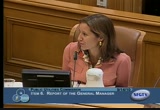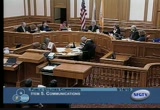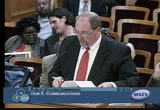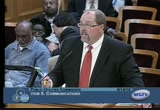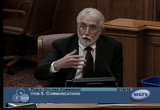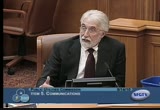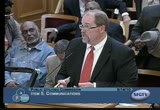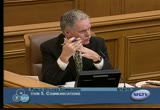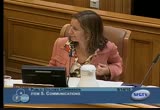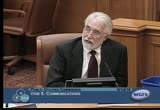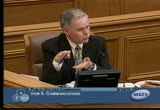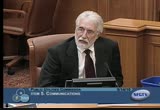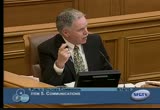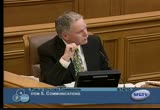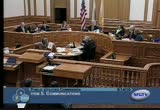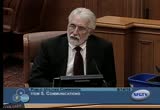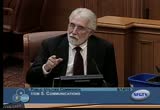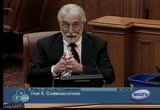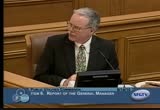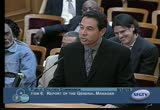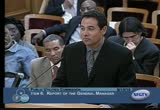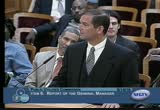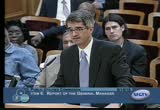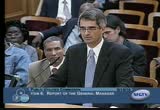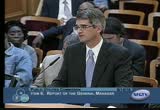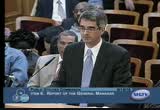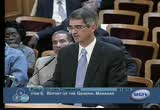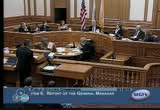tv [untitled] September 16, 2010 7:30pm-8:00pm PST
8:30 pm
on these important issues. i think this is a wonderful solution and opportunity. i think we will really be able to get some amazing things done with juliet in her new role. congratulations. we are so excited to work with you in this new capacity. president crowley: -- president crowley: let me echo of that and say i am looking forward to no longer being the junior member of the commission. now we are going to talk more often. i think this is a great jumping off spot to collaborating with you and the community, and working with you and through you to get where we need to go in this organization. thank you for accepting the offers. >> it is a good match.
8:31 pm
>> the commissioners have received electronically copies of all the communications sent to us since the last regular meeting. if you have any issues or points you would like to raise or ed regarding the advanced calendar, if you could also note those. the commissioners have also received the two indicated staff reports. >> i have some questions. first of all, i want to thank you for putting on the budget hearings well in advance. we usually wait until the last moment and scramble around. i do want some clarification. not the budget hearing, but under january 20, that is a thursday. but we are adopting -- is this a regular -- are we making this a regular meeting on january 20? >> we have several ceqa reviews
8:32 pm
coming up. as you know, the planning commission meets on thursdays. there will be several instances where we will be asking you if you will consider having a regular meeting or a special meeting of the commission the same day as the planning commission so that if they adopt the findings the commission can do it the same day. >> i see. going back to the schedule budget hearing -- january 13, i believe, is the regular meeting day. no -- it's a thursday. january 11 would be our regular meeting. i wanted to ask for an update of the 10-year financial plan. is that going to be a lengthy discussion? and if not, could we have it on our regular meeting of january 11?
8:33 pm
>> todd reedstrom, assistant general manager. we would be happy to schedule that as early as you would like that. in addition to hearing the update on the 10-year financial plan, right as you're going into your deliberations will also be updating that. we will report information. as well, we have a place holder in early december for some pre- budget discussions of budget policy setting that we wanted to come before you and give you an early indication of key trends in water consumption and waste water treatment to help inform your policy decision for the upcoming budget hearing. so we would be happy to move that to whatever day you would like. >> i am just trying to be efficient with our time. i should not say it that way. if it is going to be a lengthy
8:34 pm
discussion, i think the 13th is fine. if it is not going to be, we could incorporate it with our regular meeting of the 11th. that is something we have to hear from you. >> i think it is a great suggestion. it will not be that link the. we will need five to 10 questions -- 5 to 10 minutes depending on your questions. as you come into your budget hearings, we can look up the next few years. i know you are very interesting -- very interested in seeing what the about your fifth impact is. i look forward to being able to summarize those in five minutes and be able to give you the impact on the rates, and of course answer any questions you would have on that. >> altogether, the discussion would be about a half hour?
8:35 pm
>> about 20 minutes to 30 minutes. >> that goes to something i wanted to ask about as well. you had the preliminary budget discussion with the commission. that is something we have asked for. i appreciate your putting that on. one of the things i hoped to get from that is the discussion of the plan in a pro forma, if you will. there is a 10 year plan we will be updating. you should be able to get pretty close on that. i would like to be able to focus on some of the big-picture questions we have -- improved levels of service for the clean water program. there will be some budget in rate impact. we have looked in the past at some pretty sizable rate
8:36 pm
increases. we have talked about constraining that in some way. i would love to have on the 14th a discussion that focuses at that level. what are we trying to accomplish in the budget? what kind of constraints to we want to put on it before the budget comes to us? then my expectation would be that after we go to the budget process that the adoption of the 10-year plan should be pretty straightforward, if we know what target we are trying to hit earlier in the process. and what i am not especially interested in -- and i do not know what the policy is going to be. i am not especially interested in having an opportunity to identify a pet project of mine ahead of time. if i have any of those i can tell you anyway, but that is not really the focus. my focus would be from a large
8:37 pm
business perspective. what do we want our financials to be looking like? what do we want to make sure is accomplished? how does this coming budget it into that? >> thank you. the general manager's budget hearings will be happening in november and early december. he has already tasked us to have those ready for you. we will update for the general manager during those hearings, based upon the status quo which you have already adopted in your 10-year capital plan and the existing levels of service. we will update those again for you to make them fresh at the january. in addition, the december 14 meeting -- it will be helpful if you can start listing how you would like the budget displayed. in previous years, sometimes you wanted it program radically. other times, you wanted financial metrics as far as what the cost of $1 million would be
8:38 pm
in the average monthly bill. -- in previous years soc, somets you wanted it programmatically. the biggest picture to be starting with is that between the economy and water conservation our revenues are down. while we certainly have not been impacted as much as general fund departments, it will probably be a time of constraint in the puc. you should expect not to see a lot of brand new things show up unless something else is traded for it. commissioner moran: i think december is kind of late in the process. you will have done a lot of your work. i would like to see how satisfactory that is. if we were to give a change of
8:39 pm
direction, december would be pretty late to do it. we will see how that plays out and can adjust schedules and other things. commissioner caen: to follow up on what you just said, maybe you can help us identify on if there is something that can be traded out, if there is something emerging that seems to be a priority everybody seems in agreement with, to come back to us and said they knew we can give a little less money to that to be able to do this. >> anything else? president crowley: in the issue tracking, you did at the -- you did add a review of the hedghet assessment and the capital projects we are talking about
8:40 pm
there. one thing that occurs to me would be awfully helpful at some point is also to have a discussion about the consequence of issuing debt against hetch hetchy. it does strike me -- it is certainly not new. it strikes me it could be a tricky credit to evaluate. i think some discussion of that and how we want to deal with that, how we structure that into the financial plan would be helpful. it might as well be at the same time we are talking about this. >> we have done a whole lot of work around that. we can bring it forward. if prop 26 passes, it could change that dramatically. prop. 26 is a bit of a sleeper right now. it is not getting much
8:41 pm
attention. in its simplest form, it would tend to have power revenues for government agencies treated in many ways like prop 218 requires for water and wastewater. the most immediate impact would be that -- for example, right now we provide power to the airport tenants. the airport tenants pay us lower than they would pay pg&e, but pay us more than it costs us to generate the power. we use those extra proceeds to finance other programs. prop. 26 would say it cannot -- you cannot charge more than it costs you to generate your power. it would not allow government agencies to generate any income to be used for other projects. it would be a major impact on general fund to the city, all of the programs we have been doing using hetchy money. president crowley: it sounds
8:42 pm
like prop 16 revisited. >> only municipally owned utilities, not on investor-owned utilities. i believe the board of supervisors will have a item introduced to have the city go on record against the proposition. president crowley: i noticed also you have now -- commissioner moran: i noticed you have also scheduled the allocations. that is well in advance of the end of the year deadline. it does strike me that may take more than one meeting. i do not know if that is the way it is planned on there. i think it shows a decision as opposed to a setup. >> i am the assistant general manager for water. it should be on decision on december 14. november is just a discussion to
8:43 pm
make sure we are on the same page. vice president vietor: i am sorry. i had a follow-up on prop. 26. how would that affect cca? >> it would not have a dramatic impact on cca, because the way we are envisioning it is it would simply pass through the cost and only the cost, and we would not have any kind of profit. when we said profit, if we charge somebody a pg&e rate, that is more than our cost. that is where the profit comes in. nobody pays more than if the use pg&e, but it would lower it to what our cost of generation is. to the extent we used hetchy power in cca, we would only charge generation costs. vice president vietor: would
8:44 pm
that impact the negotiation of the contract with the cca provider because of the profit? >> i do not think so. again, it would only impact that, and potentially in a positive way, if we were going to be buying power from another municipal entity. it would limit how much it could charge us. that is probably on the margin, not a major part of it. president crowley: it takes all of the financial incentive out of any energy conservation. >> exactly. vice president vietor: that is one in -- i am from the city attorney -- >> i am from the city attorney's office. that is only one interpretation. that is only one reading which could be given to it.
8:45 pm
>> we will give you a fact sheet on that. vice president vietor: in november -- on the november ballot? >> yes, it is. president crowley: anything that needs to be received? commissioner moran: there were several things distributed with the agenda binder that are in essence staff reports that were not listed. they in some cases were pretty important and significant stuff. i am suggesting that they should be. >> a number of them were received at the end of the week. there were sent out immediately. those show up on the next -- but what i can do is start bringing amended ledger summary is that the show everything that has been updated. those will show up on the next report. commissioner moran: what
8:46 pm
confuses me on that is they were distributed to us, and i figured if there were timely to be distributed to us there were timely to be posted. >> i will do an amended versions of this so everything sent out to you is listed at the meetings with a matching list. some things come in at the end and roll over to the next meeting. commissioner moran: just to point out -- there was a wsip annual project report that was interesting in that it responds to issues that were raised by people from the state department of health. i think there were useful discussions in those cases. the commission essentially pointed out, in case we did not know it already, that the cost of delay on some of these projects is not simply the cost of inflation to the project.
8:47 pm
it is a prolongation of risk. that is important to think -- to keep in mind. it is a point well taken. the west side recycled water project -- there is an update to how that is proceeding. that is a project that is about $8,000 an acre foot. it is a significant project from a variety of standpoints. as we look at the triple bottom line, this is pretty expensive. that is going to go to environmental review and a lot more discussion before it comes to us for action, but i wanted to point that out. four audits are in there. they are exactly the kind of audits i hope we are doing for our internal operations, making sure things do not fall into disrepair over time. i guess all of those were done
8:48 pm
by the controller. and then the last one -- there was a memo on the price of alternate water supplies. that gets into calculated unit cost, the cost per acre foot of some projects we are doing. i think starting a baseline of information will be very useful to us as we have water supply discussions in the future. thank you for those. if we can somehow coordinate these things so they are posted when they are distributed? >> yes. president crowley: anything else? todd, it was also going through our information, and i saw the rebuttals article in the west side observer. i thought it was good to get the communication tool out to folks so they know we are capable and functional in terms of watching their money. thank you for putting that in. >> thank you.
8:49 pm
>> mr. president, the next item is item 6, report of the general manager. >> we have had part of the report. a couple other items that are not on the agenda -- one is that the police department is making some changes in its management. we are saying goodbye to captain perra and saying hello to captain erlich. you have his resonate in front of you -- his resume in front of you. >> i am the san francisco police department capt and director of homeland security. we were notified very recently from the chief there have been some changes to route the police department. one of them obviously impact the
8:50 pm
sfpuc. he has asked myself and captain erlich to switch commands. i will be moving over and overseeing the sex crimes unit, the child abuse and exploitation unit, the missing persons unit, and along with those a number -- working with a number of advocates for children. this is a very sensitive type of investigation to be conducted. we are putting cases together against those predators who would prey on our most defenseless population -- our children. i am looking forward to this future assignment, but it is bittersweet. i want to thank each of you. mr. harrington through all of the managers come up field personnel -- all of the managers
8:51 pm
through field personnel. everyone was wonderful. the vast and complicated system i was requested to oversee in establishing some of the security protocols for homeland security were immense. i built what had been established and took it to the next level. john will be moving forward with the next level as well. i truly want to thank you. the sfpuc should be very proud of its employees -- what dedication i have seen through all levels. very dedicated. everyone bent over backwards to exist me whenever -- to assist me whenever i made requests. i am always at the service of the sfpuc, wherever i served in the police department. thank you. >> my name is john erlich. [applause]
8:52 pm
i have then a captain in the police department since 1997, employed in the police department since 1980. i have experience in city government. you have my resume in front of you. i have had some experience with the puc when i ran the combined charity campaign. puc was one of the department's contributing to the campaign. i already had some exposure. i look forward to working with all of you. it is going to be interesting. thank you. [applause] >> captainin -- in a short time with us, you have won a lot of parts of country. thank you very much. there is also an update on the incident in san bruno thursday night.
8:53 pm
the director of water supply and treatment was very involved, as long -- as well as other members of the organization. >> good afternoon, commissioners. i am david briggs with the water supply treatment commission. -- treatment division. the response to last thursday's explosion by the puc staff was amazing. it was immediate and multifaceted. there was certainly a response by the fire department here and at the airport. that was very rapid and throw. puc staff or the first ones on the scene. some of us live in san bruno, 20 to 30 staff. they are our neighbor and wholesale customers. within minutes of the explosion, we knew exactly what was happening. staff at the tracy water treatment plant were only 2 miles away. staff there felt, heard, and saw the explosion.
8:54 pm
we have staff in the watershed that live half a mile away that were sent immediately. once we pinpointed the location, we quickly determined our system was okay. that was the first thing we were concerned with -- our own ability to keep delivering water. we verified that within minutes and then made ourselves available for mutual aid. obviously, the situation was very chaotic and real time on thursday night. our activities in the first few hours after the incident were four fire support. our first issue was making sure san bruno has water. they get all their water from us. they do have some ground water wells, but in the upper elevations it is all from puc. obviously, the explosion damaged their distribution system and their ability to get water to the firefighters. we were making sure we had water delivered to the rest of san bruno so they could get water to the area. we also brought water up by
8:55 pm
truck, which we had immediately available. if you saw the video, you saw the helicopters ferrying water over and dropping it on the fire, which was literally the only thing they could do in the first few hours after the incident. the water was all coming from san andreas reservoir. friday, we switched to recovery support for san bruno. we sent plumbing cruise up to the area to the devastated area of and viewed the crater where the explosion was to aid the investigation for pg&e, who were on the scene. we speak to san bruno stuff every day and make ourselves available to any other support they need. i can give you more details on that and what is happening on the ground now if you care to hear. the short story is we are making ourselves available for any additional help. it is also important to realize
8:56 pm
we were available with more humanitarian support. we have water trucks that are always ready to go in san francisco and on the peninsula that were ready. they were not needed. the impacted area relative to the mutual aid response was small. there was plenty of mutual aid available and so our water trucks were not needed. but they were ready in case there were called upon. the other issue the general management wanted to address was the location of the pg&e pipeline, which is on everybody's mind right now. we are in a good position to know where pg&e's pipelines are relative to our own assets to assess vulnerability. we have meticulous records of all the permits and easements granted to pg&e from us, the land owner. we were there first in almost every situation. we have 700 easements and permits granted to pg&e in san
8:57 pm
mateo, santa clara, and alameda 0 county alone. i cannot speak to other areas. 700 easements in areas where pg&e facilities of any type are on our land. 12, we have already determined, are 12-inch diameter pipe lines carrying natural gas. we have already narrow the 700 down to 12. we will begin investigation to was the crossing is like, how well the construction was done, what kind of access rights we have. we will begin to thoroughly worked through all of those areas where pg&e pipelines across our infrastructure and will have this resolved within a week. the larger liability picture relates to our own assets. we own and operate a large water transmission system in an urban
8:58 pm
area with high-pressure pipelines. we have five dams that are upstream of populated areas in the bay area. staff are continuously evaluating not only the vulnerability of those assets to their ability to deliver water, but also public safety. it is a continuous effort. we are making no greater statement right now then investing with the wisa program and the large capital investments. in parallel to that, we have a thorough asset management program which is well documented. it houses all of our assets, the condition they are in, the maintenance programs used to take care of them, including the corrosion program, which has been getting a lot of news. when any deficiencies are detected in our regular inspections, that feeds directly into our cip so we can address that deficiency.
8:59 pm
i have asked myself many times in the last five days, what would happen if the public, the media, or my peers in the water industry were to come into my office and look at my documents for my inspection records, how do maintenance, how i take care of things, and whether i am on top of things, because this is exactly what happened to pg&e. i feel very comfortable. we are very much on top of things. >> thank you, mr. briggs. commissioner caen: i do have a question. the pipes that are on our land. can we demand of pg&e to inspect them? >> that would probably come down to the terms in the easement, which is probably where our legal rights would be housed. it is common in easements and permits that one of the stipulations is that they do nothing tha
74 Views
IN COLLECTIONS
SFGTV: San Francisco Government Television Television Archive
Television Archive  Television Archive News Search Service
Television Archive News Search Service 
Uploaded by TV Archive on

 Live Music Archive
Live Music Archive Librivox Free Audio
Librivox Free Audio Metropolitan Museum
Metropolitan Museum Cleveland Museum of Art
Cleveland Museum of Art Internet Arcade
Internet Arcade Console Living Room
Console Living Room Books to Borrow
Books to Borrow Open Library
Open Library TV News
TV News Understanding 9/11
Understanding 9/11